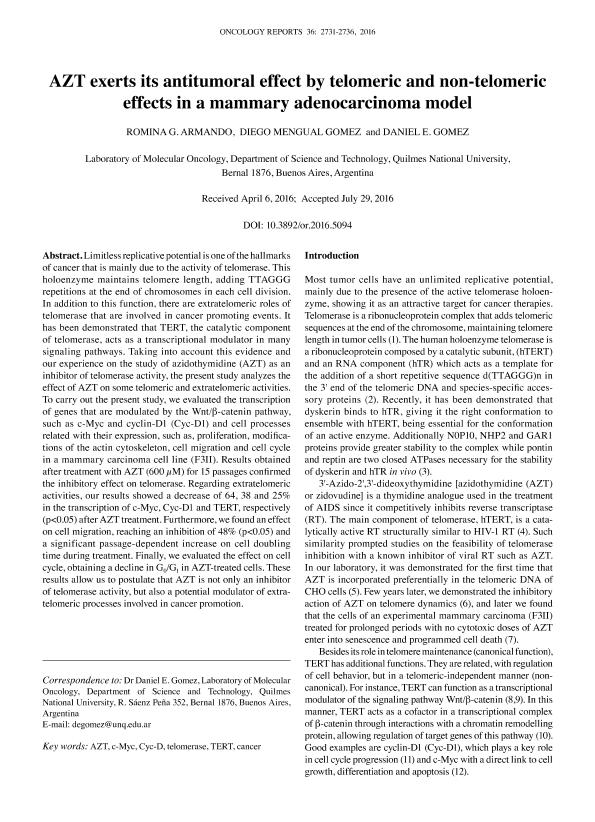Mostrar el registro sencillo del ítem
dc.contributor.author
Armando, Romina Gabriela

dc.contributor.author
Gomez, Daniel Eduardo

dc.contributor.author
Gomez, Daniel Eduardo

dc.date.available
2018-05-31T14:17:23Z
dc.date.issued
2016-11
dc.identifier.citation
Armando, Romina Gabriela; Gomez, Daniel Eduardo; Gomez, Daniel Eduardo; AZT exerts its antitumoral effect by telomeric and non-telomeric effects in a mammary adenocarcinoma model; Spandidos Publications; Oncology Reports; 36; 5; 11-2016; 2731-2736
dc.identifier.issn
1021-335X
dc.identifier.uri
http://hdl.handle.net/11336/46768
dc.description.abstract
Limitless replicative potential is one of the hallmarks of cancer that is mainly due to the activity of telomerase. This holoenzyme maintains telomere length, adding TTAGGG repetitions at the end of chromosomes in each cell division. In addition to this function, there are extratelomeric roles of telomerase that are involved in cancer promoting events. It has been demonstrated that TERT, the catalytic component of telomerase, acts as a transcriptional modulator in many signaling pathways. Taking into account this evidence and our experience on the study of azidothymidine (AZT) as an inhibitor of telomerase activity, the present study analyzes the effect of AZT on some telomeric and extratelomeric activities. To carry out the present study, we evaluated the transcription of genes that are modulated by the Wnt/β-catenin pathway, such as c-Myc and cyclin-D1 (Cyc-D1) and cell processes related with their expression, such as, proliferation, modifications of the actin cytoskeleton, cell migration and cell cycle in a mammary carcinoma cell line (F3II). Results obtained after treatment with AZT (600 µM) for 15 passages confirmed the inhibitory effect on telomerase. Regarding extratelomeric activities, our results showed a decrease of 64, 38 and 25% in the transcription of c-Myc, Cyc-D1 and TERT, respectively (p<0.05) after AZT treatment. Furthermore, we found an effect on cell migration, reaching an inhibition of 48% (p<0.05) and a significant passage-dependent increase on cell doubling time during treatment. Finally, we evaluated the effect on cell cycle, obtaining a decline in G0/G1 in AZT-treated cells. These results allow us to postulate that AZT is not only an inhibitor of telomerase activity, but also a potential modulator of extratelomeric processes involved in cancer promotion.
dc.format
application/pdf
dc.language.iso
eng
dc.publisher
Spandidos Publications

dc.rights
info:eu-repo/semantics/openAccess
dc.rights.uri
https://creativecommons.org/licenses/by-nc-sa/2.5/ar/
dc.subject
Azt
dc.subject
C-Myc
dc.subject
Cyc-D
dc.subject
Telomerase
dc.subject
Tert
dc.subject
Cancer
dc.subject.classification
Otras Ciencias Biológicas

dc.subject.classification
Ciencias Biológicas

dc.subject.classification
CIENCIAS NATURALES Y EXACTAS

dc.title
AZT exerts its antitumoral effect by telomeric and non-telomeric effects in a mammary adenocarcinoma model
dc.type
info:eu-repo/semantics/article
dc.type
info:ar-repo/semantics/artículo
dc.type
info:eu-repo/semantics/publishedVersion
dc.date.updated
2018-05-30T15:31:39Z
dc.journal.volume
36
dc.journal.number
5
dc.journal.pagination
2731-2736
dc.journal.pais
Grecia

dc.journal.ciudad
Atenas
dc.description.fil
Fil: Armando, Romina Gabriela. Universidad Nacional de Quilmes. Departamento de Ciencia y Tecnología. Laboratorio de Oncología Molecular; Argentina. Consejo Nacional de Investigaciones Científicas y Técnicas; Argentina
dc.description.fil
Fil: Gomez, Daniel Eduardo. Universidad Nacional de Quilmes. Departamento de Ciencia y Tecnología. Laboratorio de Oncología Molecular; Argentina. Consejo Nacional de Investigaciones Científicas y Técnicas; Argentina
dc.description.fil
Fil: Gomez, Daniel Eduardo. Universidad Nacional de Quilmes. Departamento de Ciencia y Tecnología. Laboratorio de Oncología Molecular; Argentina. Consejo Nacional de Investigaciones Científicas y Técnicas; Argentina
dc.journal.title
Oncology Reports

dc.relation.alternativeid
info:eu-repo/semantics/altIdentifier/doi/https://dx.doi.org/10.3892/or.2016.5094
dc.relation.alternativeid
info:eu-repo/semantics/altIdentifier/url/https://www.spandidos-publications.com/or/36/5/2731
Archivos asociados
